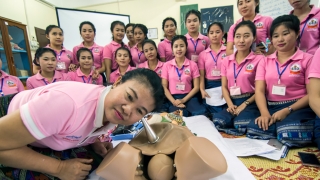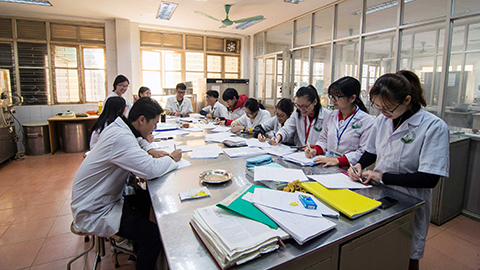Support for the National College of Midwifery
— Laos —

BACKGROUND
The latest available statistics (for 2012) show that mother and child mortality levels remain high in Laos*: For every 100,000 live births, 470 women die here, compared with the world average of 210, and in 2012, the child mortality rate was 54 in every 1,000 live births. Why? The difficulty of accessing care in this essentially rural country and the shortage of doctors are both factors, but so is the absence of qualified midwives. To improve the health of its population, reduce mother and child mortality and morbidity and increase life expectancy, the Ministry of Health wishes to develop preventive medical programmes for the general public, and training programmes for healthcare personnel.
The first 4-year BACHELOR-level degree course was set up in 2011 at the Faculty of Nursing Sciences (Laos University of Health Sciences) with support from the French College of Gynaecologists and Obstetricians (CNGOF) and the Lao Anakhod Association of French healthcare professionals (general practitioners, gynaecologists and midwives), the majority of whom are Lao, have been trained in France, almost all of whom are Lao speakers, and who have responsibility for delivering part of the training. The first intake of 20 midwives graduated with BACHELOR-level degrees four years later on completion of a training course inspired by the French syllabus.
In 2015, Fondation Pierre Fabre was requested by the authorities and the Lao Anakhod Association to step in after the period of financial support provided by the CNGOF had come to an end. It decided to engage with the college via a five-year development plan to run from 2016 to 2020.
This programme sets out to provide support in the following areas: expansion of teaching capacity (in-service training, French and English language tuition and refresher courses), support for the training of student midwives to BACHELOR degree level (by introducing practical training in Laos and Thailand with personal coaching for trainees, training delivered by the Lao Anakhod Association, and the introduction of hands-on practical experience), and funding for learning equipment and resources for both the theory and practical elements of the course.
As a result, four cycles of students will receive this support between now and 2020, resulting in the graduation of more than 80 new midwives.
*Source: Unicef
Since the start of the programme
- 60 students graduated since the beginning of the programme
- 29 training missions
- 7 in-service training courses delivered
- 3 internship in France for two lecturers
- Attendance at 3 international conferences
- 3 internship in Thailand for all 4th-year students
KEY FACTS
_____
Priority
Training for medical professionals
Programme
Since 2016
Type of involvement
Distributor and operator
Objectives
- Continue to boost the professional skills of faculty stakeholders
- Raise awareness among the community about the importance of maternal and child care
- Reinforce health structures to guarantee quality healthcare
THE LATEST PROGRESS
_____
Training of teaching staff
Training in medical English (14 lecturers), training in how to boost the skills of staff working with women and newborns (5 participants, University of Burapha, Thailand)
Student training
Online course on care during pregnancy (21 female students with the equivalent of a 4-year Bachelor’s degree)
Participation in an international conference on how to reinforce the capacity for resilience of health workers (University of Khon Kean, Thailand)
The Laos National College of Midwifery
Perspectives
By 2020, four cycles of student midwives will have graduated from the National College of Midwifery. Enhanced and supported by five years of international cooperation and skills transfer, the abilities of local lecturers will allow the college to be fully self-sufficient.
PARTNERS
The National College of Midwifery – Laos
Lao Anakhod Association
See also
Rehabilitation of the Vientiane Faculty of Pharmacy
An initial partnership agreement was signed on 10 May 2005 and the Foundation embarked on the project with a threefold challenge before it: to fully satisfy the request, but, more importantly, to rally local youth around this renaissance and give the institution wings to fly on its own.
27/07/2018See also
Mekong Pharma Network: an expanded university structure for educators in pharmaceutical sciences
Following on from the Master Mekong Pharma programme (2012-2019), from which 133 Asian students graduated with a Master’s degree in Pharmaceutical Sciences and which facilitated creation of a network of academics between Asia and France, the Fondation Pierre Fabre was eager to maintain and expand the connections between the four partner universities in Vietnam (HUP-Hanoi, UMP-HCMC), Cambodia (UHSC-Phnom Penh) and Laos (UHSL-Vientiane).
16/03/2021Follow our actions
Mobile Clinics in the Central African Republic: Caring for Survivors of Violence
This unique initiative in the Central African Republic enables thousands of women to access crucial healthcare services and rebuild their lives.














